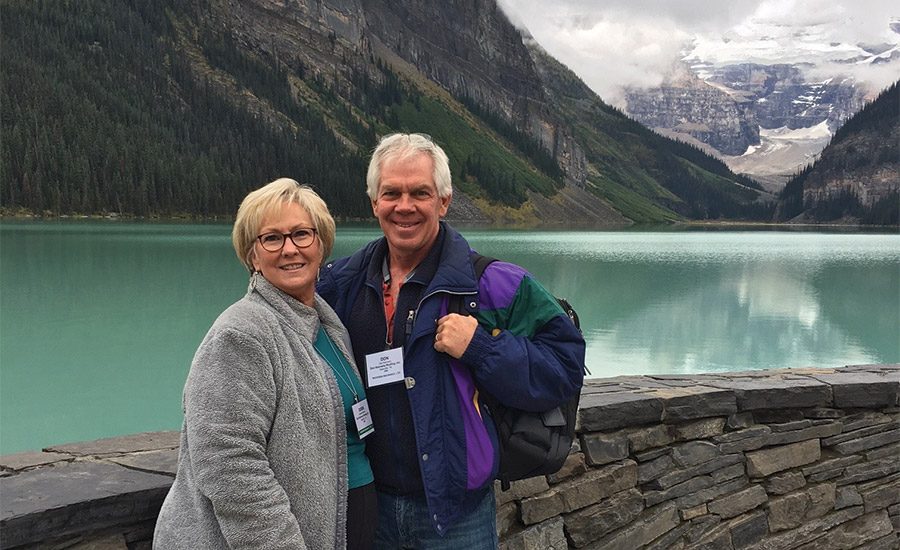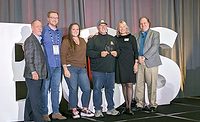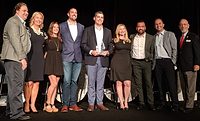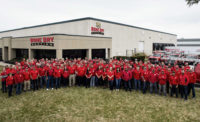2019 Commercial Contractor of the Year: Don Kennedy Roofing
Don Kennedy Roofing found immense success by opening its books and making everyone an owner

Don Kennedy Roofing receiving the Commercial Roofing Contractor of the Year Award at the 2019 Best of Success conference. From left: RC Editor Art Aisner, RC Publisher Jill Bloom, Debbie Kennedy, Don Kennedy, Donnie Kennedy, Amanda Durham, John Hillis, and RC Editorial Director Rick Damato.

Debbie and Don Kennedy in Canada for a roofing event. Don credits much of his success to working with his family, including his sons Daniel and Donnie, and his wife, Debbie, whom he calls his “kingpin.” Photo provided by Don Kennedy.

By opening the company’s financial records for all employees to see, Don Kennedy Roofing has seen revenue and net profit increase for the past three years.

This condominium complex in Franklin, Tenn., is an example of the fine workmanship Don Kennedy Roofing provides. Photo courtesy of Don Kennedy Roofing.




When observing Don Kennedy Roofing’s operations, one would think it was run by a rigid army commander due to its high efficiency.
No one sits at meetings, which last no longer than 15 minutes; everyone must dress professionally; equipment must be cleaned and stored properly; materials are meticulously weighed, inventoried, and recycled; every job is followed by an after-action review — a practice the actual United States military performs after missions.
But President and CEO Don Kennedy is anything but a drill sergeant barking orders. Instead, he’s a compassionate owner who wants to make a difference in people’s lives. He said he cares about his workers as if they were family, because to him, they are.
“We’re not about making money, that’s the result. We’re about developing people, that’s our goal, is growing people and giving them better lives,” Kennedy said.
It’s this drive to constantly seek improvement that earned Don Kennedy Roofing RC’s 2019 Commercial Roofing Contractor of the Year. As a family-owned company, Kennedy accepted the award with a number of his family members in attendance at the Best of Success conference in Miami last September.
“It was a great surprise,” Kennedy said. “As soon as I found out, I had tears in my eyes…This is just a summation of everything that the people we work with has come together and they’ve created a great thing.”
Located in Nashville, Don Kennedy Roofing was formed in 1978. Kennedy began the business out of his house at age 19, which grew thanks to word-of-mouth advertising. His business now serves the Greater Nashville area, including Davidson, Williamson, Rutherford, Somner, Wilson, Cheatham and Robertson counties.
The business earned accreditation in 1994 and has maintained an A+ rating with the Better Business Bureau (BBB). The BBB also honored Don Kennedy Roofing with its Torch Award for Business Ethics, making winning RC’s Commercial Roofing Contractor of the Year the latest addition to its accolades.
But things weren’t always this smooth for the roofing contractor. It took hard work, a willingness to adapt, and a daring, unique strategy for Kennedy’s company to arrive where it is today.
A Game-Changing Strategy
Around 18 years ago, Kennedy saw a need to make a change in his company’s culture. He wanted his employees to share in his vision — to become a family that strives for improvement. Slow and steady improvements were made, but it wasn’t until 2016 that the Kennedy family made a bold move that’s practically unheard of in the industry.
They opened the financial books to everyone in the company.
“The key to this is: How do you expect people to buy into what you’re doing if you don’t let them know what is going on?” Kennedy explained.
The “Open Book Management” strategy emerged from taking courses at Harvard University where Jack Stack, author of “The Great Game of Business,” was a presenter. Kennedy and his company’s head of accounting, John Hillis, then attended workshops held by Stack to learn the ins and outs of this approach.
To test the waters, Kennedy asked his employees what they thought the business made in net profit. Surprisingly, the workers responded with margins of anywhere from 30 to 70 percent, and that Kennedy was “taking wheelbarrows full of money” home every day.
Of course, the real percentages were far different, and the workers learned the industry average is just 2 to 5 percent.
“Even when I was showing the numbers they still thought I was a liar,” Kennedy said.
More importantly, though, the Kennedys emphasized the importance of net profit, not just revenue. Employees learned about profit and loss, and how running the company was not too different from handling their own personal finances. The strategy not only demonstrated transparency and trust, it laid out how the company’s bonus system works. Using simple spreadsheets, employees can check on how much revenue needs to be brought in to receive a bonus, whether it’s at 10, 15 or 20 percent.
Even after ensuring the numbers were true, Kennedy admitted it has been a long process in shifting the company’s culture.
“It’s so hard to get other people to change,” Kennedy said. “This is the hardest thing that you’ll ever do.”
Achieving Efficiency
What emerged from the open-book strategy was efficient meetings held daily, weekly and quarterly. Before heading out for a project, every department attends a pre-job meeting to discuss everything from the initial bid to hours and customer expectations. When a project is finished, crews and managers debrief to determine what went right, what went wrong and how to improve.
To keep everyone on task, the company comes together at 6 a.m. every Friday morning to open the books and have its 10 departments report their revenue. They then must explain why the numbers are up or down.
“When we create revenue budgets for next year, we let them set their own goals, because if I set it, they’re not nearly as likely to want to hit it,” Kennedy said.
The company’s management style takes the approach spelled out in the book “2 Second Lean” by businessman Paul Akers. The goal is to become lean and fix what’s broken, even if that fix only saves about two seconds of time. Kennedy said the book is required reading for staff members.
Kennedy said the drastic shift in the company culture initially resulted in heated arguments, but as time went on, the teams all learned to communicate with one another, which has even resulted in innovations.
In one example, an employee in the metal shop told Kennedy they were having issues with the metal orders they received. They decided to pay $3,500 for commercial scales to weigh the metal they purchased. Sure enough, the metal they received did not match the amount they ordered.
“It more than paid for itself the first month,” Kennedy said.
Other employee-driven innovations include having nearly everything on wheels to avoid wasting time lifting and carrying items; and installing a fuel station on site that saves the company time and between $150,000 to $200,000 annually since the crews don’t have to go to the store for gas.
It’s striving to work smarter, not harder, Kennedy said, and it’s paid off. The company has seen increases in revenue and profit since implementing the open-book strategy. In fact, the roofing contractor’s long-term goal is an ambitious 20 percent net profit in the year 2020.
“When you prepare right and that job goes as smooth as it possibly can, that is when you’re going to start making money,” Kennedy said.
Taking Care of Your Own
While this sounds like a high-pressure work environment, the people making sure this well-oiled machine keeps running aren’t viewed as lowly grunts. Instead, they walk around with pride, as if each and every one of them was the owner, which is exactly how the Kennedys like it.
“If you ask most leaders what they do in their business, what they say is ‘I am here to take care of my customers,’ and that’s all wrong,” Kennedy said. “If you’re a leader and you run a business, your responsibility is to take care of the people that take care of your customers.”
For instance, new hires are honored with company picnics, where the employees can invite their families so they can all celebrate becoming a part of the Don Kennedy Roofing family. There is even a prayer list posted for employees to write down prayer requests.
Kennedy said the construction industry is among the least trained industries. To set his employees apart from others, every department receives weekly training, including at its own Gilbert Davis Training Facility. Kennedy said this leads to each worker having confidence in their craft.
Taking care of employees is a top priority for the business, and word has gotten out. Kennedy said they hardly need to recruit because people are lining up to join, which is a rarity in an industry suffering from a workforce shortage. Combined with financial transparency and an efficient workplace, it’s no wonder people flock to be a part of it.
“This is what drives everybody, and they eventually all come together,” Kennedy said. “You see roofers in the hall hugging each other telling them they love each other… it’s a big family deal, and that’s what we wanted to achieve.”
In turn, employees are expected to present themselves accordingly. As an example, the lobby of the Don Kennedy Roofing building features mannequins dressed in appropriate work attire. They serve as examples to everyone who walks through the door on how employees should dress.
“We try to build pride into the things that we do,” Kennedy said. “We want people to recognize what we stand for. It isn’t the money, it’s about serving our people that work here and serving our customers.”
That pride even extends to the company’s fleet. Before attending their debriefings, workers need to ensure their vehicles are clean so that, when they’re driving to and from jobs, they’re properly representing the company.
Debbie Kennedy, Don’s wife (known affectionately as “Mama” to many of the workers), said in the end it’s all
about making a difference in people’s lives and serving
the community.
“I say we’re in the roofing business, but I really think we’re in the people business,” Debbie said. “Everybody doesn’t come from the same background and have the same things that you have growing up, and we want to make a difference.”
As the president and CEO, Kennedy leads by example. He has served on the board of directors and executive committees for both the National Roofing Contractors Association as well as for the BBB. The business itself is involved with the Wounded Warrior Project, Susan G. Komen, St. Jude Children’s Research Hospital and Nashville Rescue Mission.
In accepting the Contractor of the Year award, Kennedy shared a story that told the audience at Best of Success everything they needed to know about how his company treats its employees. He said they hired a worker who had come out of jail, but one day, he found the worker outside crying. The man told Kennedy that he didn’t want to “be that person I used to be.”
“I told him, ‘You don’t worry about it, you’re at the right place, because we have your back and you’ve got a support team here that will help you become the person that you want to be,’” Kennedy recalled. “What I can tell you today is, every day when I see that guy walking through the warehouse, he says to me ‘it’s a great day to have a great day.’”
Looking for a reprint of this article?
From high-res PDFs to custom plaques, order your copy today!














